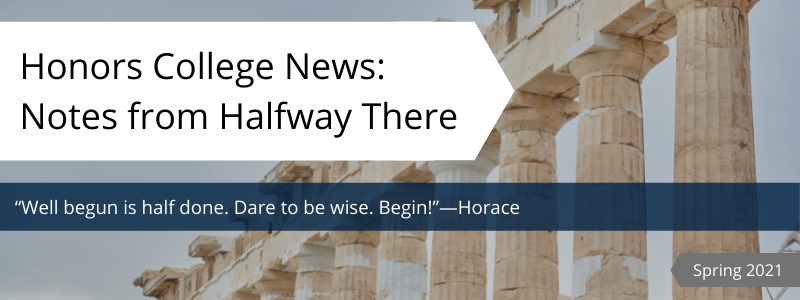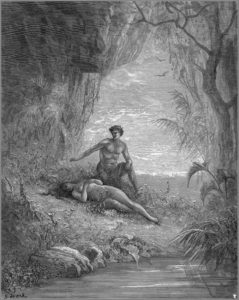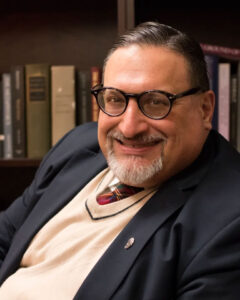
Dear Friends of the Honors College,
What, if anything, or who, if anyone, can provide the hope we need to live? The Honors College provides a feast of beautiful wisdom for its students, but can Honors Scholars find hope through studying the works set before them? I have been pondering these questions for the past few months, and the questions seem as urgent as ever. However, as I study history, these questions, or some version of them, turn out to be perennial. Our age and our societies are not special in their need for hope.
One place to look for hope is, of course, Socrates. In the midst of his great and declining Athens, Socrates seems optimistic. He seems to me to be thinking that, out in the agora, maybe today is the day I might meet someone by chance or divine providence and have a conversation that discloses the truths we need to live virtuously and well. Alas! He doesn’t always find such conversations or even people interested in having them. But he persevered even in the face of death. Why? What could give him such hope? Is it right to even call that hope?
Or consider any of the heroic figures we study: Achilles, Odysseus, Aeneas, Beowulf, to name a few. Maybe they can show us the way, either in word or deed. Alas.
Or perhaps some instruction might be given that we could learn and live by. Maybe Epictetus with his “some things are up to us, and some are not”? Or Hume with his “to the flames”?
So, then, what about Jesus? Is he any different? Can he provide hope where other people cannot? Christians have always answered yes, but what does it take to be genuinely persuaded that such an answer is true and to live one’s life in light of that genuine belief? In reply, Christians have emphasized that persuading ourselves of the genuine hope found in Jesus begins with a careful study of his words and deeds as recorded in the gospels and continues in an ongoing interactive relationship with him. Whether we try Jesus first or last or somewhere in between, those are the necessary starting points for any inquiry into the serious possibility that he can provide the hope without which we are daily, wordlessly terrified.
In the Honors College, we will always offer students the opportunity to begin from these things in order to live full of hope. This fall, we are eager to try something new to learn together about the nature and necessity of hope. During the usual lecture portion of the Honors College curriculum, we will bring together all Honors Scholars for a series of lectures on hope by the Honors College faculty. We look forward to lectures on Socrates and the other heroes we read about as well as the nature of hope as described by Tolstoy, Shakespeare, and the New Testament, to name a few. These lectures will be recorded and made available online for readers of this newsletter to watch. Our hope is that we can continue to provide resources like this for our Honors College alumni and friends.
Gary Hartenburg
Director, The Honors College
Houston Christian University

 My name is Nadine, and I am from Rwanda. My family moved to the United States when I was about five years old. I’m majoring in computer science. I am also a member of TRIO (student support services) and a Hopper Fellow.
My name is Nadine, and I am from Rwanda. My family moved to the United States when I was about five years old. I’m majoring in computer science. I am also a member of TRIO (student support services) and a Hopper Fellow. In John Milton’s Paradise Lost, just before that fatal first sin, Eve suggests to Adam that they work separately to increase the efficiency of their labors in the garden of Eden. Adam praises Eve for her desire to be productive, but then adds this word of caution:
In John Milton’s Paradise Lost, just before that fatal first sin, Eve suggests to Adam that they work separately to increase the efficiency of their labors in the garden of Eden. Adam praises Eve for her desire to be productive, but then adds this word of caution:
 I am currently a law clerk at the Supreme Court of Texas working in the chambers of Justice John Devine. I graduated from the University of Houston Law Center last May in 2020. I just passed the Texas bar exam in October! At HCU I majored in government and minored in economics. I was photography editor at The Collegian, was heavily involved in the Honors College, was tech head for the Rex Fleming Players, and revived the South Asian Student Association on campus. After graduating from HCU, I was accepted into Teach for America and taught middle school at Pilgrim Academy in HISD for three years. All of these experiences have allowed me to grow into the person I am today.
I am currently a law clerk at the Supreme Court of Texas working in the chambers of Justice John Devine. I graduated from the University of Houston Law Center last May in 2020. I just passed the Texas bar exam in October! At HCU I majored in government and minored in economics. I was photography editor at The Collegian, was heavily involved in the Honors College, was tech head for the Rex Fleming Players, and revived the South Asian Student Association on campus. After graduating from HCU, I was accepted into Teach for America and taught middle school at Pilgrim Academy in HISD for three years. All of these experiences have allowed me to grow into the person I am today.